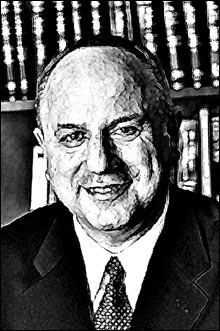Receiving almost $3 million in annual salary and benefits in each of the last two years, Lifespan CEO George Vecchione is the highest-paid health-care executive in New England. Vecchione collects almost $1 million more each year than the CEO at the region’s largest health care network, Partners HealthCare System in Boston, although Lifespan is much smaller than Partners, and New England’s second largest network, Caritas Christi Health Care, also in Boston. In 2007, only Lahey Clinic CEO David Barrett approached Vecchione’s compensation, thanks to a one-time supplemental retirement benefit of $1.5 million; even with that payment, Barrett received $300,000 less than the Lifespan leader.A Phoenix survey of federal tax returns indicates that one other Rhode Island health-care CEO, John Hynes of Care New England Health System, received more than $1 million in compensation in 2007. Two Lifespan executives, Kathleen Hittner, CEO of the Miriam Hospital, and former Rhode Island Hospital CEO Joseph Amaral, received more than $1 million in compensation in 2006. Lifespan officials say this was a one-year anomaly caused by changes in federal reporting requirements.
According to a survey by Modern Healthcare magazine, most Rhode Island hospital CEOs are paid more than the national average for comparably sized institutions. CEOs at several of Rhode Island's smaller and financially weaker hospitals, South County and Westerly hospitals and Roger Williams Medical Center, are exceptions. In addition, raises for Rhode Island health-care CEOs far exceed the inflation rate. Since 2000, compensation for the 10 CEOs who stayed in their jobs increased by an average of 87 percent, while the consumer price index climbed only 20 percent.
"Most employees, and probably most Rhode Islanders, would be appalled to know executives of our nonprofit hospitals are being paid these kinds of salaries," says Rick Brooks, director of United Nurses and Allied Professionals, "particularly when health-care costs are going up [at] twice the rate of inflation and causing the number of uninsured Rhode Islanders to go up dramatically."
Some of these executives run hospitals and some hospital networks, but they all help make up the infrastructure of health-care in New England.
The lucrative executive compensation packages also raise questions about the management of Rhode Island's nonprofit hospitals as they struggle to fend off Governor Donald L. Carcieri's proposal to cut state reimbursement to hospitals, by almost $32 million, to help balance the state budget. At a House Finance Committee hearing in January, South County Hospital CEO Louis Giancola, Rhode Island's lowest-paid hospital CEO, predicted the cut in funds to cover the uninsured "is going to destroy us," the Providence Journal reported.
Yet according to Karen Malcolm, executive director of the liberal advocacy group Ocean State Action, "It becomes very hard to make their case when they are paying their top executives so much money."
The subject of executive compensation has ignited national controversy. In January, President Barack Obama called Wall Street bankers "shameful," for awarding themselves huge bonuses while accepting federal bailout funds. On February 4, Obama (who earns $400,000) announced a $500,000 cap on cash compensation for executives at companies that receive federal bailouts.
Although the local hospitals have not received federal bailout money, Christopher Koller, Rhode Island's health insurance commissioner, estimates that more than half of their revenues are paid by the government-financed Medicare and Medicaid programs. Sole control of compensation for the hospital CEOs, however, rests with the boards of directors of their respective institutions.
David Gifford, director of the Rhode Island Department of Health, declined to comment on the high level of CEO pay, saying he needs more information on comparable compensation elsewhere, but he warned that lower salaries could produce weaker hospitals.
Regardless, the state Health Department has no explicit authority to regulate CEO compensation, he says. And neither does Attorney General Patrick Lynch, according to the chief of his civil division, Jim Lee. "If somebody thinks there ought to be a law limiting the compensation of CEOs of nonprofit institutions," Lynch spokesman Michael Healey says via e-mail, "they should take it up with the legislature."
But the legislature, with the state facing hundreds of millions of dollars in state debt, is struggling with other issues, and it has not showed any inclination to tackle this topic.

TOP DOG: While some criticize Vecchione’s lucrative compensation, one observer calls him a workaholic who is always on call and constantly handling crises. |
How big salaries get madeAlfred Verrecchia, the chairman of Lifespan's board of directors, defends the generous salaries paid by Rhode Island's largest hospital network."If you go back several years ago, Lifespan was running a $50 million deficit," Verrecchia says. "George Vecchione and his team have rebuilt the financial soundness of Lifespan . . . We have to pay competitive salaries, [because] otherwise we won't be able to hire the managers that you need to run an institution as complex as Lifespan."